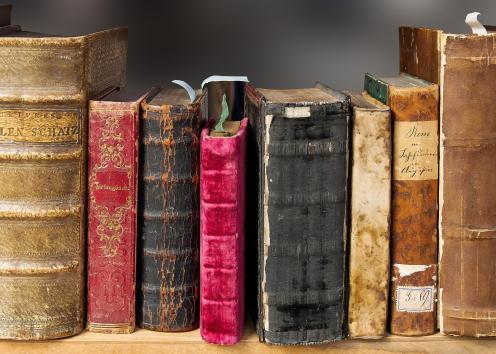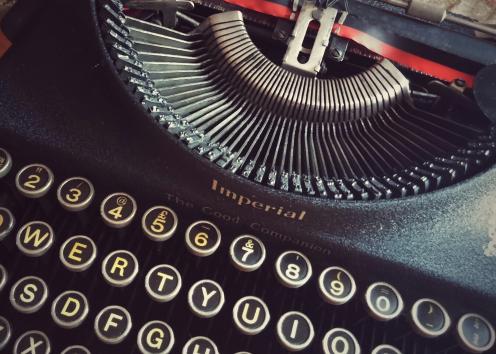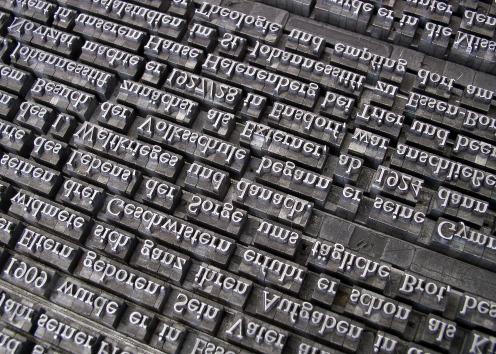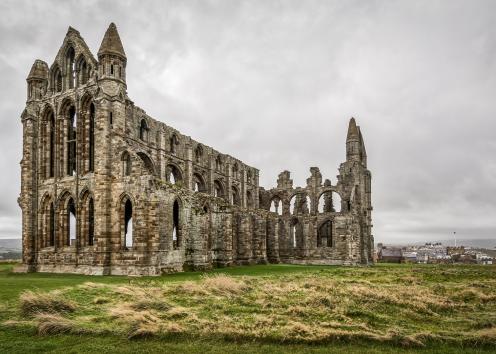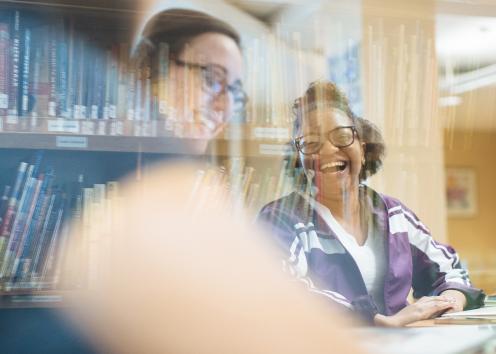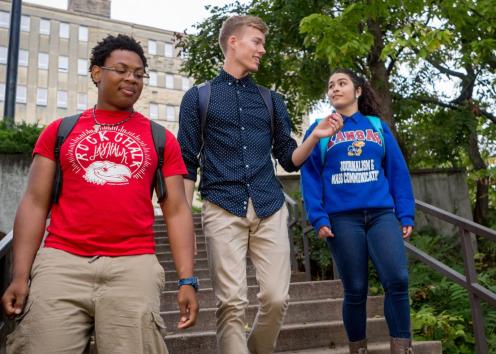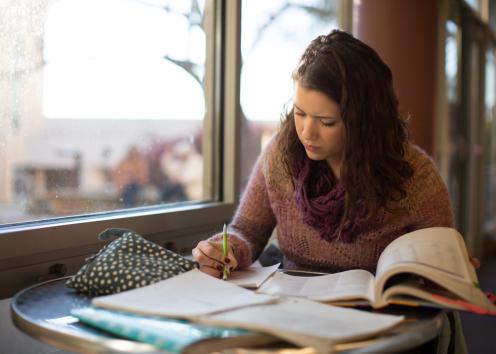Introductory English Courses Spring 2026
ENGL 105: Honors Introduction to English - Murder, They Wrote
Instructor: Megan Dennis
27606 | TuTh 9:30-10:45 AM | Fraser 222
How do we understand representations of crime and victimhood in literature and culture? Representations of crime, victims, and suspects have broader implications for the ways we understand embodiment, social mores, and justice. Crime and detective stories have retained a foothold in the Western imagination since the days of Edgar Allen Poe’s Dupin and Arthur Conan Doyle’s Sherlock Holmes. These texts hold us in suspense, while also revealing anxieties among society’s members, particularly regarding containment of behavior and identities society deems improper or dangerous. Through critical engagement with literature across a variety of genres and time periods, this course will delve into the realm of crime literature as a means to interrogate the dominant frameworks in which we live. Students can expect to engage with such works as Doyle’s The Adventures of Sherlock Holmes, Agatha Christie’s The Mousetrap, Truman Capote’s In Cold Blood, Louise Erdrich’s The Round House, as well as true crime cases presented in popular podcasts such as My Favorite Murder (and others.) Our writing assignments will include some shorter reading responses/ in-class writing activities, as well as three major writing projects and a final reflection.

ENGL 209: Introduction to Fiction
Instructor: Brian Daldorph
44422 | MWF 10:00-10:50 AM | Wescoe 4019
45736 | MWF 11:00-11:50 AM| Wescoe 4019
In this Introduction to Fiction class, we will be reading
and analyzing short stories from different times and
places, exploring the techniques and conventions of
fiction. We will cover established writers such as F.
Scott Fitzgerald, Tolstoy and Chekhov, and also read
the works of some more contemporary writers. The
class will also offer opportunity for your own fiction
writing. We use an anthology of short stories.

ENGL 210: Introduction to Poetry
Instructor: Mara Waltz
52808 | MWF 11:00-11:50 AM | Fraser 219
52809 | MWF 12:00-12:50 PM | Fraser 219

ENGL 220: Introduction to Creative Writing
Instructor: Kevin Mulligan
51497 | TuTh 11:00 AM-12:15 PM | Fraser 223
52801 | TuTh 2:00-3:15 PM | Fraser 223
In this course, students will study the practices of creative writing in three genres: short fiction, creative nonfiction, and poetry. Through rigorous inquiry, discussion, and creative experimentation, students will gain a strong understanding of each genre’s conventions, strategies, and contexts--and then will put that knowledge into practice to produce original writing. Writing assignments in the course will be split between critical work, which analyzes the technique and function of various creative pieces and allows students to read creative works as potential models or sites of learning opportunities, and creative work, which allows students to develop their own creative philosophy as it applies to each genre they work within. In lieu of a final exam, students will submit a portfolio of their revised work, along with a short reflection paper.
Instructor: Alex Crayon
52810 | MW 2:00-3:15 PM | Fraser 222
52811 | MW 3:30-4:45 PM | Fraser 222
In this course, students will study the craft of creative writing across four genres: poetry, fiction, creative nonfiction, and playwriting/screenwriting. Throughout the semester, students will first survey these genres, reading and discussing exemplary models of each, and will investigate the conventions that writers follow—and break—when composing their creative work. In addition, students will produce four original creative pieces, one for each genre, to apply their study. This class will then include a workshop component during which students will provide both written and oral feedback to their fellow writers by immersing themselves in a constructive critical atmosphere. At the end of the semester, students will submit a portfolio of their revised creative work and a short reflective essay.

ENGL 300: Introduction to English Studies
Instructor: Colleen Morrissey
49437 | MW 2:00-3:15 PM | Wescoe 4076
50226 | By appointment | Online
What do we mean when we say we “study English” in the 21st century? How is it possible that the same academic field includes the study of Shakespeare’s plays, Toni Morrison’s novels, Kendrick Lamar’s song lyrics, politicians’ social media posts, business memos, and the crafting of an original poem? What do you actually get out of an English major or minor? In this course, students will learn the histories, approaches, and intersections of the three major areas of English: Literary Studies, Rhetoric and Composition, and Creative Writing. Together, we will examine and enact the core techniques that make up the study of English, including literary analysis, rhetorical analysis, cultural criticism, craft analysis and creative composition. Students will hone the critical thinking, research, and writing skills that are the backbone of English studies by analyzing texts of all kinds—literary, professional, political, just to name a few—and practicing those techniques in their own original projects. Ultimately, students will leave this course with a firm grasp of the different branches of English studies, the place of English studies in academia and the broader world, and a sense of their own future potential pathways as students and thinkers.

ENGL 309: The British Novel
Instructor: Hannah Scupham
55798 | TuTh 2:00-3:15 PM | Wescoe 4076
Adventure, passion, intrigue, humor, deception – just a few elements of the wonderful world of the British novel. Have you ever wondered how the novel became the dominant, beloved genre of literature? In this course, we will explore the development of the British novel from the late 18th century to the early 20th century. From early epistolary novels to lush Realism, from quiet domestic tales to dramatic sensation fiction, we will examine the social, cultural, and political backdrops to some of the best novels in the British tradition. Join us for a world filled with luscious prose, thrilling plots, complex characters, and vivid explorations of the mind and heart. Texts will include: Samuel Richardson’s Pamela, Jane Austen’s Pride and Prejudice, Charlotte Brontë’s Jane Eyre, Wilkie Collins’s The Woman in White, and E.M. Forster’s A Passage to India.

ENGL 318: Topics in American Literature Since 1865: Protest Literature
Instructor: Sarah Ngoh
55801| TuTh 12:30-1:45 PM | Wescoe 4037
In this interdisciplinary course we will examine the rich tradition of American protest literature (which we will define broadly as everything from early treatises from the American Revolution to contemporary hip hop lyrics and YouTube/TikTok videos of spoken word poetry), focusing on the production and consumption of dissent as a site from which to critique prevailing power structures and ideologies, and as a place from which to call for social change. We will operate under the assumption that, like Baldwin, most protest writers write from a place of love for their country/nation and are driven by their dreams of a better world.
Though we will read a few of the defining/well-known authors of protest literature (cool, old, white guys), we will also focus a good deal of our time on writers whose personal identities have worked to marginalize them socially and politically. By examining the ways in which each work assaults the status quo of an often inhumane and brutal society, we will trace a tradition of protest literature that runs parallel to and challenges hegemonic discourse in an effort to identify how authors have channeled their anger at injustice into rhetorical and discursive love.

ENGL 320: American Literature I: Beginnings to 1865
Instructor: Laura Mielke
56491 | TuTh 9:30-10:45 AM | Wescoe 4076
This course surveys works of American literature from Indigenous oral and visual literatures through responses to the U.S. Civil War and asks students to reflect on how literature contributed to the formation of cultures in what Europeans called the New World. Over the course of the semester, we will consider the variety of ways in which residents of North America, and later the United States and various Tribal Nations, used texts: to create community, to promote settlement, to worship and proselytize, to control those in the minority (especially through the category of “race”), to establish or challenge political authority, to contemplate the beautiful, to pursue social reform, and to shape national identity. This semester, we will frame literature across these decades in the context of the US semiquincentennial (i.e. 250th birthday).

ENGL 328: Literature and Film: Literature of Sports in the Movies
Instructor: Philip Wedge
55799 | MW 2:00-3:15 PM | Wescoe 4037
This course will examine works of sport literature in several genres and compare them to the film adaptations of these works. Of particular interest will be how themes, characters, settings, and so on are adapted to film. We will study works that gain “Hollywood” endings (The Natural, Golden Boy) and ones that are more faithfully translated to the screen (That Championship Season). We will also consider how different genres move to film, as we study these novels, plays, non-fiction works, and short stories. Among the films we will examine are Field of Dreams (Shoeless Joe) and Million Dollar Baby. Required coursework consists of 3 major Essays (55%), and a Final Exam (25%). Homework (20%) includes pop quizzes and shorter writing assignments. Class participation is also of considerable importance. TEXTS: Kinsella, Shoeless Joe; Malamud, The Natural; MacLean, A River Runs Through It; Odets, Golden Boy; August Wilson, Fences; Bissinger, Friday Night Lights; Hornby, Fever Pitch; Toole, Million Dollar Baby.

ENGL 329: Topics in Forms and Genres
Instructor: Mark Luce
55808 | Th 7:00-10:00 PM | Regnier 152 (Edwards)
While many have demeaned anything drawn with panels as little more than comics, there has been a boom in the quality and quantity of graphic novels in the last three decades. These works continue to grow in sophistication – tracing the horrors of the Iranian Revolution, serving as adaptations of novels, tackling questions of violence and vigilantism, and even serving as a different from of memoir. Such texts certainly require a particular brand of visual literacy and raise questions of how, exactly, to write and think about visual literature. We will survey some of the major writers and works in the genre to explore such issues.

ENGL 338: Introduction to African American Literature
Instructor: Dr. Zay Dale
55800 | MW 3:30-4:45 PM | Wescoe 4020
An introduction to prominent works of African American literature from the 18th century to the present as well as to the basic approaches to study and principles of this body of work, including its connection with African sources. Literature will include a wide variety of genres, and course materials may be supplemented by folklore, music, film, and visual arts. Prerequisite: Prior completion of the Core 34: English (SGE) requirement. Recommended: Prior completion of one 200-level English course.

ENGL 351: Fiction Writing I
Instructor: Adam Desnoyers
50225| TuTh 9:30-10:45 AM | Wescoe 4019
If you have had a life-long interest in writing fiction then this is the course for you. By studying short stories from established writers, students will learn to read “like a writer” and recognize how narrative is constructed. We will study how characters are created and are made sympathetic (or less than sympathetic) by their actions, their words, and their histories. Students will learn how to write scenes, craft dialogue, build conflict, and otherwise learn how to tell a story, which is a skill that has benefit in every field. Students will produce two short stories over the course of the semester. A class period will be allotted to each story you produce, in which you will receive feedback from all of your peers. You will have an opportunity to rewrite these stories based on that feedback before finally presenting them in your final portfolio for the semester.
Instructor: J Valencia-Cheng
51498| TuTh 11:00 AM-12:15 PM | Wescoe 4021
52812 | TuTh 2:00-3:15PM | Wescoe 4021
Instructor: Colleen Morrissey
50224 | MW 3:30-4:45 PM | Wescoe 4019
In this course, we will explore the timeless and universal craft of storytelling. Through studying published fiction and creating our own, we will experiment with the techniques that make a story compelling, meaningful, and artful. We will discuss what makes for successful plot (or anti-plot), character, conflict, voice, setting, and more. Students will compose their own fiction and practice giving and receiving constructive feedback through small-group and whole-class workshopping. Students will also practice the essential skill of revision.
Instructor: Brian Daldroph
44882 | M 5:30-8:20 PM | Regnier 354 (Edwards)
We'll study the basic elements of short story writing,
including characterization, narrative development and
dialogue. Most of the classes we will be workshopping
student-written fiction. Students must complete several
introductory exercises and three short stories, or the
equivalent, perhaps three chapters of a novel. No
textbook. Readings on Canvas and handouts. Meets
with ENGL 551

ENGL 352: Poetry Writing I
Instructor: Landon McGee
50227 | MW 2:00-3:15 PM | Fraser 225
This class will include plenty of reading from poets like Lucille Clifton, W.S. Merwin, June Jordan, Sharon Olds, Li-Young Lee, Chris Abani, Naomi Shihab Nye, Aracelis Girmay, Kaveh Akbar, and Ross Gay; even so our primary focus will be writing and revising poems. Through workshop and discussion, students will grow their knowledge of the craft of poetry, develop a sustainable writing practice, and learn to give and receive feedback with care and generosity.

ENGL 354: Playwriting I
Instructor: Darren Canady
55804 | TuTh 12:30-1:45 PM | Wescoe 4019

ENGL 355: Nonfiction Writing I: Workshop in the Essay
Instructor: Doug Crawford-Parker
50228 | TuTh 11:00 AM-12:15 PM | Fraser 225
When you hear the word “essay,” what comes to mind? School assignments? Five paragraphs? Exams? In this class, we will study and write a very different kind of essay: the essay as a form of literature where writers artfully enact their engagement with the world and with themselves. Our emphasis will be on the art and craft of the personal essay. We will read numerous essays to get a better handle on this often-slippery form. We will spend some time sharpening our sentence style, the material essays are made out of. And we will write essays and read each other’s work. The class employs a workshop format where each student reads and comments on the work of everyone else in the class and receives feedback from everyone else in the class. The workshop format of the course demands a high level of student participation, both in degree and quality.
Students will be required to write one short essay and two longer essays, keep a journal, do a presentation, and revise their work for an end of semester portfolio, in addition to reading numerous essays and other assignments. A willingness to read seriously, write, offer feedback, accept feedback, and enjoy oneself is essential for the course.

ENGL 359: English Grammar
Instructors: Wen Xin
55805 | TuTh 9:30-10:45 AM | Wescoe 4075
For many people, the word “grammar” can be intimidating because it conjures up painful memories of trying to master so many rules and unpleasant impressions of being considered wrong when any of the rules are broken. However, grammar can also be an effective way of understanding how language is used, a framework for describing the variation and creative potentials of the English language. In other words, grammar is a language we can use to talk about how language works. This course will not only introduce you to different grammatical elements at both word and clause levels, but it will also explore the variations of those elements across different contexts (spoken vs. written; news vs. academic writing vs. fiction). At the end of the course, I hope you will be able to use appropriate terms, concepts, and tools to analyze language in any context and to understand that language users, including yourself, use different “grammars” depending on the communicative contexts.

ENGL 362: Foundations of Technical Writing
Instructors: Kaitlynn Toay
45979 | By appointment | Online (Jan 20-Mar 13)
45990 | By appointment | Online (Mar 23-May 15)

ENGL 383: Cultural Rhetorics
Instructors: Sarah Kugler
55806 | MW 2:00-3:15 PM | Wescoe 4020
Who has the agency and authority to share their stories, and who does not? Whose stories do audiences listen to, and whose stories are largely glossed over or ignored? In this course, we will engage these questions through the lens of cultural rhetorics, an interdisciplinary sub-field of rhetoric and composition which explores how rhetorical communication and meaning-making are shaped by culture, and how culture shapes rhetorical communication and meaning-making. We will center decolonial, feminist, queer, critical race, and disability studies rhetorics with the goals of 1) examining how communities cultivate rhetorical practices, actions, and meanings, and 2) analyzing the critical and liberatory affordances these rhetorics offer. To this end, we will explore the relationship between rhetoric and power throughout the course, analyzing how rhetorical actions taken by individuals and communities can both uphold and challenge existing social, political, and ideological power structures. This course will include three units, focusing on theory, pedagogy, and methodology within cultural rhetorics, and will culminate in students developing an original research proposal which unites these three areas of inquiry. Overall, this course will challenge students to ask how powerful cultural forces influence whose stories are told, how those stories are told, and what rhetorical actions are available to individuals and communities seeking to shape their own futures.

ENGL 390: Studies in: Reading Novels as a Writer
Instructors: Laura Moriarty
50229 | TuTh 11:00 AM-12:15 PM | Wescoe 4076
In this course, we’ll read several novels, mostly contemporary, that have enjoyed critical and/or commercial success, and we’ll try to analyze what made them successful. We’ll read these novels as novelists, paying attention to their structures, narrative devices, story arcs, and techniques that might be useful in our own work. We’ll look at what the opening chapters accomplish, and how each author keeps the reader engaged through a novel’s middle and end. We’ll take novel-writing axioms (e.g. “The protagonist has to want something, and want it badly.”) and see if they hold up against real novels. Each student will write short papers and give presentations over the course of the semester. Students can also expect regular reading quizzes.

ENGL 492: The London Review
Instructors: Doug Crawford-Parker and Sarah Crawford
42329 | M 4:30-5:30 PM | Wescoe 4023
42329 | APPT | Abroad
Students participating in the London Review enroll in ENGL 492 or HNRS 492. The London Review is a Spring Break study abroad program through which students explore their individual interests in London with faculty support and guidance. Before Spring Break, students research museums, monuments, neighborhoods, sports venues, and other sites in preparation for the visit. As well, they read examples of travel writing as inspiration for the writing they will do upon return. After Spring Break, students collaborate to create a book documenting and analyzing their experiences.



